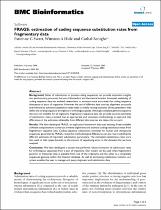| dc.contributor.author | Swart, Estienne C | |
| dc.contributor.author | Hide, Winston A | |
| dc.contributor.author | Seoighe, Cathal | |
| dc.date.accessioned | 2023-05-29T12:31:58Z | |
| dc.date.available | 2023-05-29T12:31:58Z | |
| dc.date.issued | 2004 | |
| dc.identifier.citation | Swart, E. C. et al. (2004). FRAGS: Estimation of coding sequence substitution rates from fragmentary data. 5, 8 . https://doi.org/10.1186/1471-2105-5-8 | en_US |
| dc.identifier.issn | 1471-2105 | |
| dc.identifier.uri | 10.1186/1471-2105-5-8 | |
| dc.identifier.uri | http://hdl.handle.net/10566/8946 | |
| dc.description.abstract | Rates of substitution in protein-coding sequences can provide important insights into evolutionary processes that are of biomedical and theoretical interest. Increased availability of coding sequence data has enabled researchers to estimate more accurately the coding sequence divergence of pairs of organisms. However the use of different data sources, alignment protocols and methods to estimate substitution rates leads to widely varying estimates of key parameters that define the coding sequence divergence of orthologous genes. Although complete genome sequence data are not available for all organisms, fragmentary sequence data can provide accurate estimates of substitution rates provided that an appropriate and consistent methodology is used and that differences in the estimates obtainable from different data sources are taken into account. | en_US |
| dc.language.iso | en | en_US |
| dc.publisher | BMC | en_US |
| dc.subject | Bioinfomatics | en_US |
| dc.subject | Statistics studies | en_US |
| dc.subject | Biomedics | en_US |
| dc.subject | Coding | en_US |
| dc.subject | Orthologous sequence | en_US |
| dc.title | FRAGS: Estimation of coding sequence substitution rates from fragmentary data | en_US |
| dc.type | Article | en_US |

